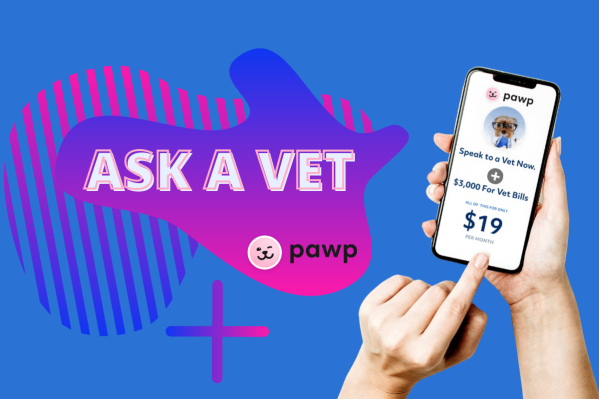Talking with a vet online has never been more necessary or convenient. Pawp’s online vets can advise on general pet questions and walk you through an emergency. Pawp’s 24/7 vet hotline provides unlimited access to experts who give answers you can trust, specific to your dog or cat. Pawp also offers emergency protection that pays up to $3,000 for your pet’s emergency vet bill. You can trust your pet’s health is in good hands with Pawp.
Every week, Pawp’s online vets answer interesting questions from pet parents. In last week’s Ask A Vet, the vets discussed dog dehydration and cat behavior. This week, Pawp’s online vets take on oral health, excessive chewing, and cat purring.
Ask A Vet Anything
Should I brush my pet’s teeth?
Yes! Dogs and cats can really benefit from brushing their teeth. Make sure you use pet-safe toothpaste (without xylitol, which is toxic for dogs and cats). They often have savory flavors your pets will enjoy. Brushing your pet’s teeth will help reduce periodontal disease, which 80% of dogs and 70% of cats will have before age 3). Not treating periodontal disease can lead to complications with a pet’s heart, liver, and kidneys. Schedule your pets for regular dental cleanings if you can as well, as they can help prevent serious health issues in the future.
What do I do if my dog drinks alcohol?
Alcohol is toxic to dogs, so if you notice your dog is vomiting, lethargic, uncoordinated, drooling, or on the verge of collapse, talk to a vet immediately. You should try to estimate as best as possible how much your dog drank and what alcohol type it is. Your dog’s size and overall health will factor into how serious the alcohol ingestion is: smaller breeds will be able to handle less, larger breeds, more. The oral lethal dose in dogs is considered 5.5 to 7.9 g/kg of 100% ethanol. If your dog is showing the above signs or has labored breathing or slow heart rate, bring them to an emergency clinic for treatment.
Why is my puppy chewing on everything?
Like babies, puppies tend to explore the world by shoving everything in their mouths. And like babies, puppies experience the pain of teething. For the first six months of your puppy’s life, they will be experiencing sore gums — and chewing on things just happens to alleviate some of that discomfort. So what can you do? Chew toys (especially designed for puppies) will help as will puppy-proofing the house and keeping all the stuff you want to remain intact out of your puppy’s reach. If they are biting you, train your puppy so they know you don’t like it and it hurts (even if it’s cute!). You can yell “ow” or put the puppy down. But of course, never be cruel when training your puppy… berating won’t get you very far. Positive attention is key.
Why is my cat drinking so much water?
There could be a few reasons your cat is increasing their water intake: kidney or liver problems, a urinary tract infection, hyperthyroidism, or even diabetes. If you notice your cat is drinking more water than usual, it’s important to keep track. Monitor your cat’s water intake for 24 hours. If your cat is drinking more than 100ml per kg of body weight in that timeframe, talk to a vet immediately. Sometimes cats can experience increased thirst after vomit or diarrhea, so it’s important to determine whether it’s just a matter of circumstance or a symptom of a chronic problem.
Why doesn’t my cat purr?
Much like humans, each cat has their own distinct way of communicating. Some cats purr, others do not — and that’s OK! Although it sounds strange, we’re not actually entirely sure how a cat’s purr is produced. The current reigning theory is that it’s a result of vibrating vocal cords. Your cat may have some deficiency in this complicated mechanism — but still be totally healthy. Cats purring starts young and is thought to be how kittens communicate with their mom while deaf and blind in their first weeks of life. But purring isn’t always a sign your cat is happy, it also happens in times of stress or even pain (the sound frequency of purring can stimulate muscle and bone growth). If your cat has other ways of being vocal, not purring shouldn’t be an issue. If you think something is wrong, talk to a vet.
